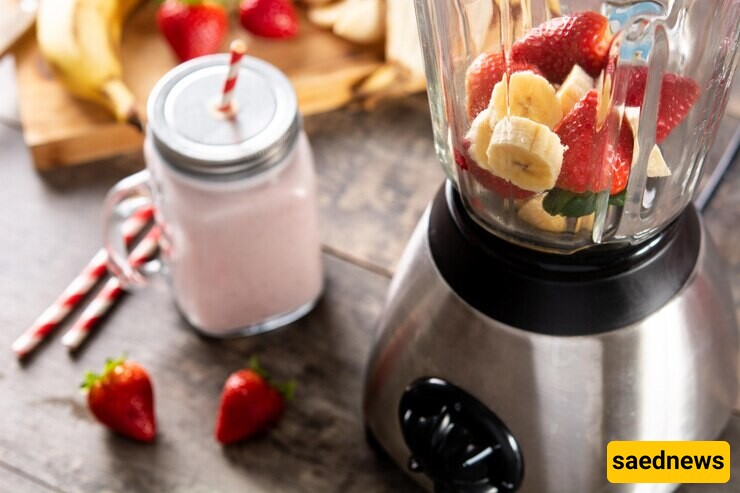SAEDNEWS: In this article, we’ll explore 10 foods that should never go into a blender and the reasons behind it.

According to SAEDNEWS, The blender is one of the most versatile tools in the kitchen, capable of performing tasks ranging from chopping fruits and vegetables to preparing sauces, smoothies, and drinks. However, despite its wide range of uses, there are certain foods you should never put in a blender.
Avoid pouring hot liquids into the blender. Let them cool down first. Blending hot liquids like soup can cause steam and pressure buildup, which might force the lid to pop off. At best, it will result in a messy spill; at worst, it could damage the appliance or cause burns. Always hold the lid securely while blending warm liquids.
Instead of using a blender, opt for a masher or hand mixer for mashed potatoes. Potatoes are starch-heavy, and blending them will produce a gluey, sticky paste instead of a light, fluffy texture.
Never use a blender for kneading bread dough. The blender cannot replicate the rotational action of a dough mixer, and it won’t knead the dough properly. The gluten in the flour will overdevelop, resulting in a dense, tough dough.
Avoid blending raw fibrous vegetables like kale, celery, or broccoli. Their tough fibers don’t break down well in a blender and can clog the blades or damage the motor. Additionally, cleaning the blender afterward becomes a hassle. If you must blend these vegetables, cook them first or use a juicer instead.

Not all blenders are equipped with powerful motors to handle ice. Blending ice in a weak blender can wear down or damage the motor. While some blenders are specifically designed for crushing ice, always check the appliance's specifications before attempting to blend ice.
Like ice, frozen fruits can strain the blender's motor if it isn’t strong enough. If you want to make a smoothie with frozen fruits, let them thaw slightly before blending.

Blender blades are not designed for grinding small particles like spices. They're better suited for chopping fruits, vegetables, and larger items. Use a mortar and pestle or a dedicated spice grinder for this purpose.
Occasionally blending coffee beans might not cause immediate damage, but over time, the hard texture of coffee beans can dull the blades and strain the motor. Coffee beans require a special grinder designed for their hardness.

Blenders are not suitable for grinding meat. Instead of producing a proper ground meat texture, a blender will create a soft, sticky paste that ruins the consistency of dishes like burgers or kebabs.
Never blend bones, even small ones. The hardness of bones can damage the motor or break the blades. Always remove bones from meat before putting it in the blender.
You’ve now learned about the foods that should never go into a blender. Putting these items in your blender could either damage the appliance or fail to produce the desired results—or in the worst case, both! Save your blender from unnecessary wear and tear by avoiding these common mistakes.

